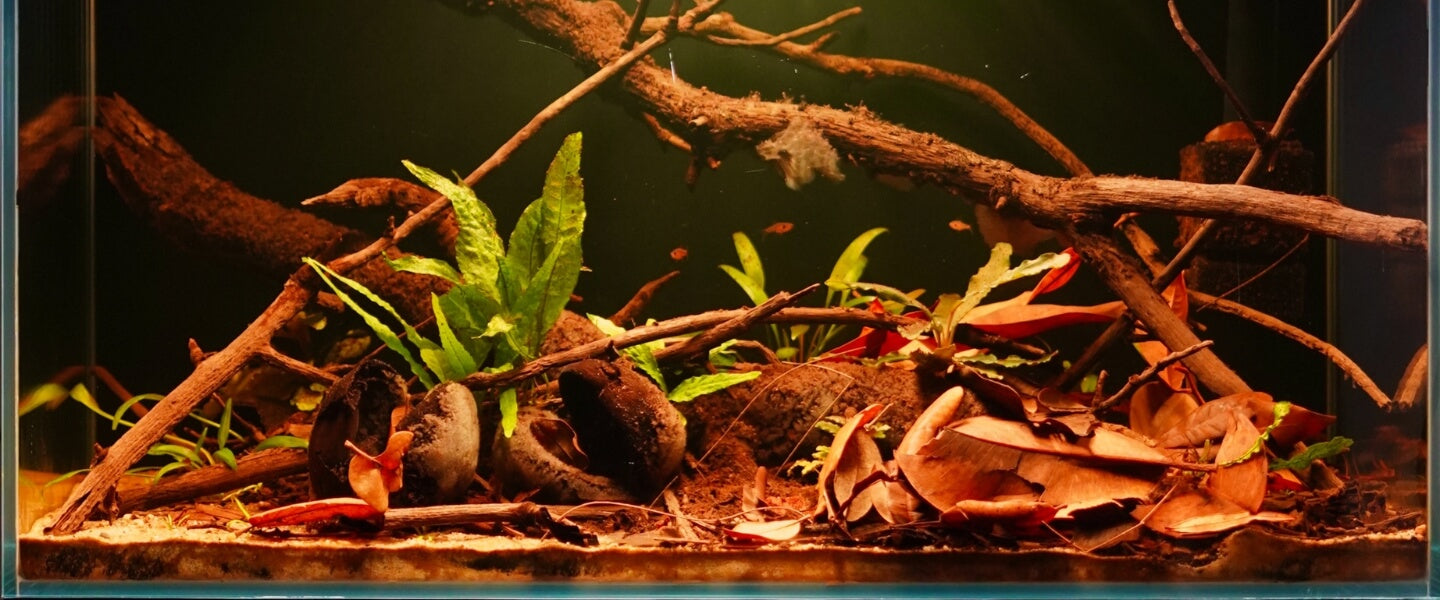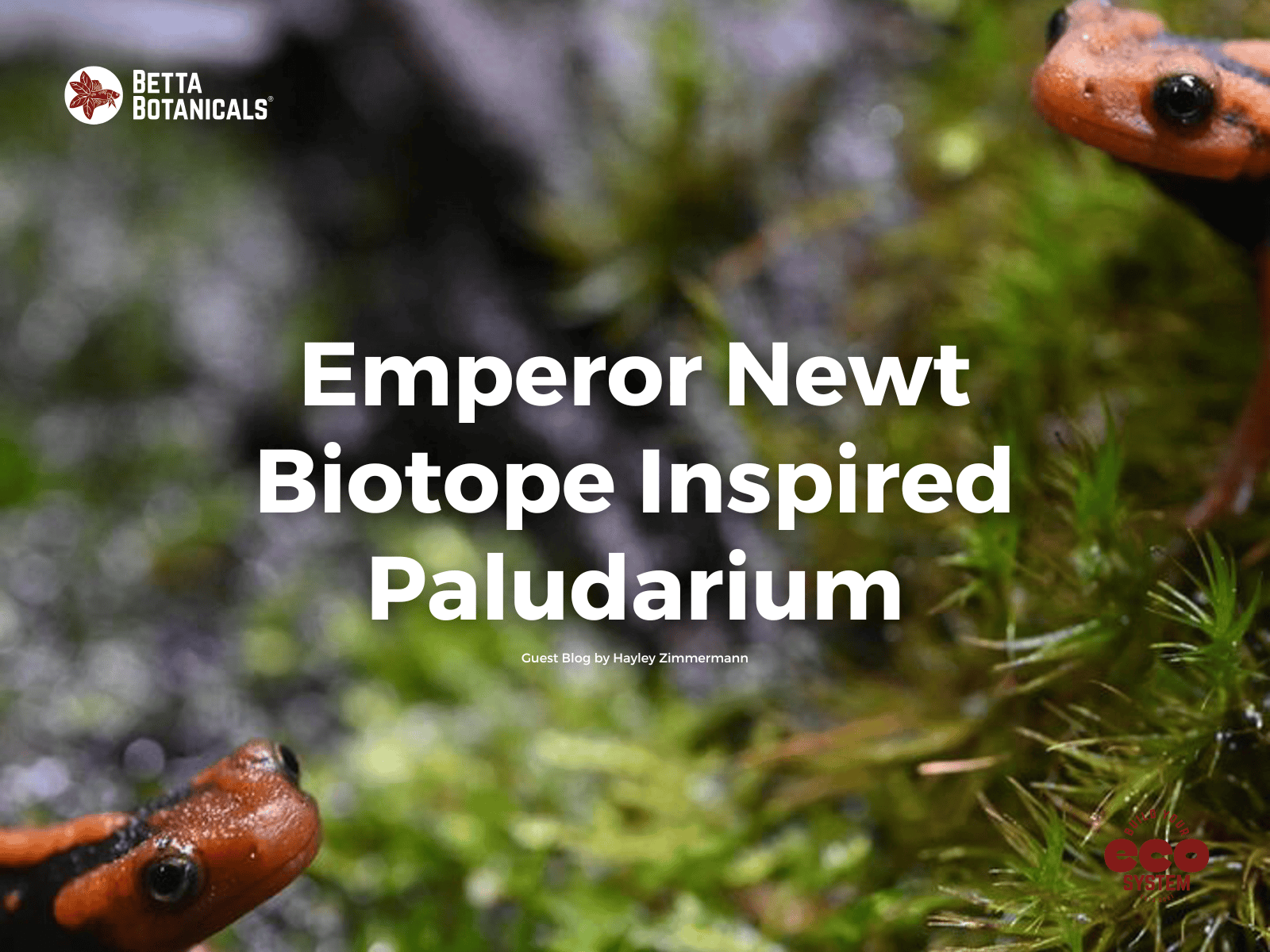Our Top 5 Aquatic Botanicals for the Beginner Botanical Method, Blackwater, and Biotope Enthusiast!
Corydoras catfish in a botanical method aquarium full of our #TanninBae Botanical Variety Pack
Whether you’re new to fishkeeping or have been in the hobby for a while, you’ve likely heard of the botanical method aquarium or blackwater aquariums. These unique aquariums achieve their signature “tea-stained” appearance through the addition of botanicals — dried plant parts and natural materials that release tannins into the water. Interested in starting a botanical method or blackwater aquarium of your own, but unsure where to start? Let's go beneath the leaves on our top five beginner-friendly botanicals.
What are Vivarium and Aquarium Botanicals?
Botanicals are natural plant materials used to enrich the aquarium or vivarium that include the dried parts of most plants, and their presence helps mimic natural ecological processes — decomposition, nutrient cycling, and biofilm growth. Aquarium botanicals commonly include seeds and seed pods, cones, leaves, twigs, needles, and bark!
Corydoras are a prime candidate for the botanical method aquarium.
Will Aquarium Botanicals Benefit MY Aquarium?
Botanicals release tannins, natural chemical compounds found in a plant's cells, and they are responsible for giving water its golden glow. Tannins are one of the benefits of the botanical method and blackwater aquarium, but other compounds such as tannic, humic, and fulvic acids are also released, which is great news if you live in a city, as all chlorinated city tapwater has those compounds removed. Other compounds like coumarins and saponins are also released.
Fish can be susceptible to fungal, bacterial, and viral illnesses caused by different stressors in their environment. In an aquarium setting, tannins have antimicrobial and antifungal properties that can help prevent fish from getting mild sicknesses. If your fish is already ill, adding tannins, along with fish medications, to the hospital tank can promote healing and help your fish recover.
Tannins are naturally acidic (pH less than 7.0), so they can be useful if you need to soften or lower the pH of your soft water. Bettas love soft, slightly acidic water, so tannins are a perfect match for a betta tank. Remember that different fish require different water conditions, so make sure you do plenty of research!
Depending on your water chemistry, tannins will have slightly different effects. If your water has a higher general or carbonate hardness, pH is less likely to be affected by adding tannins. You can check the hardness of your water using a water test kit. Look for gH and kH on your water test strips. It's also important to note that different botanicals contain different amounts of the beneficial compounds we have discussed. Even so, if a leaf falls from the tree in spring compared to fall, it will contain different compounds!

A botanical method aquarium with tiger barbs taken by Joel C. one of our #tanninbae ambassadors.
As a Beginner, what are the most Important Botanical Benefits?
Tannins (or Tannic Acid) can be just as healthy for people as they are for fish! According to a study published by the National Library of Medicine, tannins in tannin-rich foods and drinks such as tea are considered to be antimicrobial, anticarcinogenic, and antimutagenic. Science shows that tannins have the potential to prevent incidences of cancer and cell damage in humans! Please know that the botanicals we stock, including botanical tea bags, are NOT for human consumption! Botanicals additionally help to build the ecosystem of an aquarium, benefiting the fish within the habitat by providing refuge, spawning sites, and foraging grounds to display all of their natural behaviors we would see in nature. Utilizing botanical elements can be done by anyone, and they are not exclusive to an aesthetic. Please remember that if you use rainbow gravel and fake plants, you can still 100% use these natural aquarium materials.
Top 5 Aquarium Botanicals for Beginners
Now that we’ve covered the botanical basics, let’s discuss the best aquarium botanicals for beginners! These botanicals are incredibly durable and produce medium levels of tannins, some with low levels of biofilm, giving you the best of both worlds.
#1 Aquarium Botanical is Monkey Pots
Monkey pot in a botanical method aquarium for neon tetras.
Meet the Monkey Pot, a favorite here at Betta Botanicals! Monkey pots come from Lecythis Pisonis, also known as the Monkey Pot Tree or Brazil Nut tree. The monkey pot tree is a medium-sized tree native to South America and originating in Brazil. This unusual tree gets its name from the fruits and woody seed pods (similar in appearance to coconuts) that it produces, which monkeys enjoy digging into for the nutrient-rich seeds.
Benefits of the Monkey Pots in Aquariums and Vivariums
Known for their versatility across the aquarium and vivarium hobby, monkey pots provide great hides for your inhabitants. Most fish prefer some form of hide or cave to rest in and de-stress. Yes, being a fish can be stressful! Monkey pots naturally mimic the cave shape, making them the perfect addition if your tank doesn’t have a lot of hiding places. Additionally, monkey pots can provide supplemental food for your aquatic inverts, from the biofilms they grow to the selenium naturally present in their tannins. In the vivarium, they create ideal food stations to drop in fruit flies dusted with Calcium. We often stash a small piece of banana in ours so that the fruit flies congregate there before being consumed by our Ranitomeya and Oophaga species.
Fun Fact! Did you know that the monkey pot contains fruit or nuts similar to Brazil nuts? In Brazil, the oil from the monkey pot fruit is processed and turned into soap, as well as burnt as a source of light!
#2 Aquarium Botanical is Magnolia Leaves
A magnolia leaf in a blackwater aquarium for endlers.
Magnolia Grandiflora, the Southern Magnolia, is a broadleaf evergreen tree native to the Southeastern USA in habitats ranging from Virginia to Florida. The magnolia tree produces large, highly-scented white flowers in the summer months that are a favorite among Southern gardeners. Here in the PNW where Betta Botanicals is located, we have many different kinds of Magnolia Trees, but none with as durable leaves as this grandiflora variety.
Benefits of Magnolia Leaves in Aquariums and Vivariums
These interesting leaves break down slowly in your aquarium due to their durable nature. As the waxy, leathery coating disappears, it leaves behind a delicate leaf “skeleton” which adds complexity to any aquascape! Magnolia leaves are a great option if you are looking for a high-tannin, high-interest botanical for your home aquarium. They are readily consumed by snails and shrimp as a feeder botanical, and their curved shape creates natural caves on the aquarium substrate.
Fun Fact! Magnolia trees are one of the oldest varieties of trees in the world! No wonder their reputation precedes them!
#3 Aquarium Botanical is Alder Cones
Alder cones in a North American biotope aquarium.
While there are different varieties of Alder trees, we source our beloved Alder Cones from the Red Alder, Alnus Rubra. This broadleaf deciduous tree is often available in the nursery trade and is native to the northwestern USA. We hand-pick our alder cones here in the Pacific Northwest to ensure quality and safety. The Red Alder usually grows 40-50 feet tall, but record trees have grown over 100 feet! They are critical within disturbed forests at fixing nitrogen into the soils for coniferous trees to utilize as the forest matures.
Benefits of Alder Cones in Aquariums and Vivariums
At Betta Botanicals, we love Alder Cones as tannin bombs — these little guys pack a big punch! When scattered about the substrate, they help mimic a more natural environment, recruiting biofilms for consumption by shrimp as they slowly break down into detritus to fuel the beneficial bacteria of the aquarium.
Fun Fact! In Latin, Rubra means red. Due to the orange color of the inner bark, when this tree gets injured, wounds turn bright red. To say the least, it can look spooky!
#4 Aquarium Botanical is Bamboo Leaves

Bamboo leaves are a 'generic tropical' botanical, complementing any leaf litter mix.
Now found around the globe, bamboo plants are native to Asia and the Pacific islands. Our bamboo leaves are hand-collected from naturally fallen leaves, and are hand-washed and dried by our suppliers. These light yellow leaves last a long time in your home aquarium (if they aren’t eaten by your inverts first!). As of 2025, we are excited to share with our Biotope enthusiasts a bamboo leaf litter sourced directly from Colombia for your aquariums and vivariums.
Benefits of Bamboo Leaves in Aquariums and Vivariums
We love bamboo leaves for shrimp and aquatic invertebrate ecosystems! Bamboo leaves and shoots are rich in minerals, making them healthy for shrimp and snails! Depending on how the leaves are harvested, they can contain critical iron, calcium, and amino acids that invertebrates use to grow healthy exoskeletons. If you’re setting up a shrimp tank or planning to add them to an established ecosystem, check out our bamboo leaves! Some leaves benefit shrimp more than ours. Our blog post on shrimp-safe leaf litter is a great place to learn more.
Fun Fact! Bamboo is growing increasingly popular in the textile and architectural industries as an alternative to less-sustainable options like plastic.
#5 Aquarium Botanical is our Betta Tea - Blackwater Tannin Replenishment Tea Bags
Betta Tea for replenishing the tint of botanical aquariums. Photos by #tanninbae ambassador Calvin D.
Okay, we admit that this last “botanical” isn’t really a botanical, but a specially curated blend of natural botanicals to add rich, red and brown tannins to your ecosystems. We have been hard at work developing these botanical tea bags to re-tint your aquarium for those who don't like the look of leaves, or for ecosystems not ready to take on more leaf litter — but need more tint!
Benefits of Betta Tea for the Aquarium
Betta Tea contains a blend of aquarium botanicals specifically used by betta breeders to both condition and help aid in disease recovery. While we fully support the use of Rooibos tea in the aquarium, for those looking to replicate the natural conditions of their betta, with beneficial compounds these fish would naturally be exposed to in nature, there is no beh-tta tool than Betta Tea. Our unique blend of leaves, bark, and seed pods speaks for itself.
Fun Fact! While this product is #TanninBaeApproved, we don’t recommend it for human consumption. Don’t drink the fish tea!
How to Prepare Aquarium Botanicals for Beginners
Aquarium botanicals being prepared for use in an aquarium.
What do I need to consider before using aquarium botanicals?
Botanicals can come from any plant, but not all of those plants or plant parts are safe for your home aquarium. However, we take great care to ensure that all of the aquarium botanicals we stock are safe for your aquatic and vivarium inhabitants – fish, shrimp, snails, dart frogs and more!
When it comes to botanical safety, preparation is key. Sometimes, contaminants like dust or bird shit can be left on the botanicals from the harvesting or shipping process. That’s why we have a simple method to prep your botanicals for aquarium use.
Rinse. Boil. Drain. Strain. Soak
Our botanical preparation method includes a few simple steps! First, rinse your botanicals under tap water for 60 seconds, then boil them for 5 minutes. Tap water is fine for this step. After the first boil, drain the water down the sink. Next, boil (or soak) your botanicals in dechlorinated water to make them waterlogged and fish-safe. You can use your favorite dechlorinator to prep your botanicals, and this second batch of water is safe for aquarium use!
Additionally, remember to add your botanicals a little at a time instead of all at once. If you have any questions about our preparation method, please check out our page on preparing aquarium botanicals!
The Best Aquarium Botanicals for Beginners like You!
Not only do aquarium botanicals provide health benefits for your fish, but they also mimic their natural environments! While the tannin-rich aesthetic isn’t for everyone, at Betta Botanicals, we want to help you bring a little slice of nature into your home. If you’re ready to explore the world of botanical method or blackwater aquariums, we are happy to support you every step of the way. Explore our collection of aquarium botanicals for beginners (including the botanicals mentioned in this blog)!
Good luck and happy fishkeeping!
Written by Clare Mangan, @The.Grumpy.Betta, with edits from #TanninBae















Inspire your friends:
If You're a Beginner Blackwater Aquarist, Start with a Botanical Variety Pack!
What's the Truth About Aquarium Tea & Tannins?